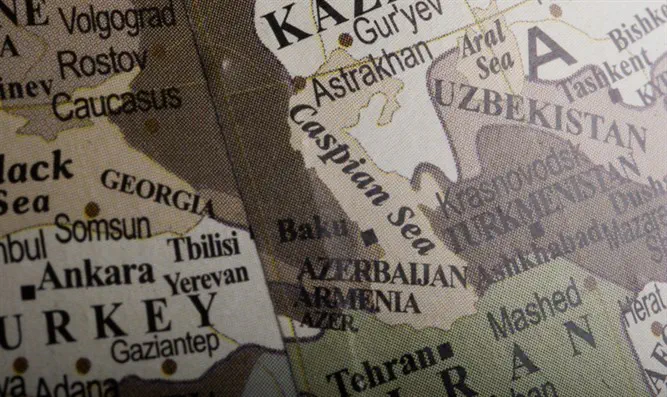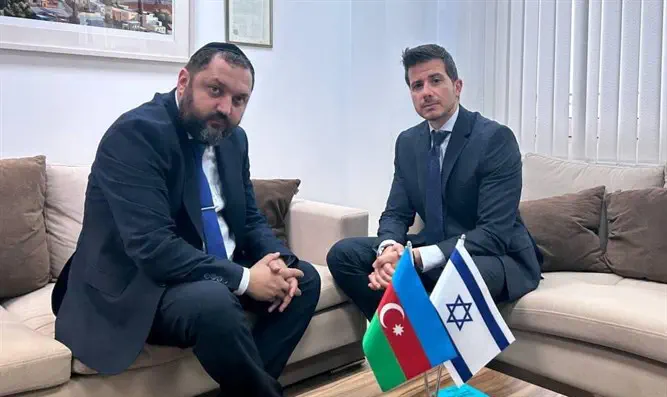
In their latest meeting, Israeli Prime Minister Benjamin Netanyahu and Azerbaijani President Ilham Aliyev's assistant, Hikmet Hajiyev, discussed the continuation and expansion of cooperation between the two countries.
They talked about the possibility of Azerbaijan joining the framework that has been widely discussed since 2020, which resulted in historical moments, diplomatic successes, and controversies, specifically the Abraham Accords. In what context? They discussed the possibility of Azerbaijan joining the expansion of the Abraham Accords, which centered around Israel normalizing relations with the United Arab Emirates, Bahrain, and Morocco (also Sudan, although there are no economic relations with it).
"Azerbaijan is one of Israel's most reliable partners in the Muslim world for three decades, and its strategic importance for regional security architecture cannot be overstated," said a senior Israeli official. A recent study by the Begin-Sadat Center for Strategic Studies, titled "How to Effectively Engage Azerbaijan in Trump's Regional Plans and Israel's Interests: Practical Recommendations," was recently published. The study argues that Israel and pro-Israel forces in the United States should actively support Azerbaijan's inclusion in American-Israeli regional partnerships for development, investments, and technology cooperation.
Since the signing of the Abraham Accords in 2020, Israel has been collaborating with Morocco, Bahrain, and the United Arab Emirates. Recently, Israel has conducted trilateral cooperation with Morocco and the United States in the fields of defense, artificial intelligence, and cybersecurity. The plan is to expand this cooperation to Gulf countries with ties to Israel. If Israel expands its public collaborations within the Muslim world to include Azerbaijan, it will strengthen Muslim sentiment towards these partnerships and enhance its image as a country that is welcomed in the Muslim world, or a "normalized" country in the Muslim world.

Furthermore, involving Azerbaijan in the Abraham Accords currently serves the Trump administration's strategy to expand multilateral cooperation among U.S. allies to reduce America's economic burden on defense and regional development projects. Beyond how the expansion of cooperation between Israel and Azerbaijan will help Israel’s economic and political goals, it will benefit the United States even more.
A senior U.S. think tank, the Atlantic Council, recently commented on this and concluded, "Washington should learn from Israel’s diplomatic and security collaboration with Azerbaijan to bolster its own ties with Baku. Besides being a bulwark against Iran, close relations with Azerbaijan could help the United States gain a stronger foothold among Central Asian countries, with whom Azerbaijan has been developing stronger relations. This would be especially important for the United States, as Central Asia is rich in minerals and energy and is home to the Middle Corridor, a trade route from Asia to Europe that bypasses both Russia and Iran".
Beyond the international relations between Azerbaijan and Israel and how close they are despite religious differences, Azerbaijan is one of the Muslim countries that best welcomes its Jewish population. According to the "Institute for Monitoring Peace and Tolerance in School Education," Azerbaijan is the first Muslim country where the education system teaches all of its students (not just Jews) about antisemitism, the event known as the "Holocaust," and promotes values against Islamist ideologies that are popular with their southern neighbor, Iran.
Instead of teaching hatred of the other (in this case, the Jew), Azerbaijan's curriculum promotes values of tolerance, acceptance, diversity, and respect for Jews and the State of Israel. In addition to teaching about the Jewish religion and national heroes of Azerbaijani Jewish descent, the curriculum also covers the Israeli-Palestinian conflict. Unlike in other Muslim countries, where the conflict is discussed without even mentioning Israel by name, referring to it as the "Zionist entity," and where other details are fabricated at best, in Azerbaijan, students learn about the UN Partition Plan and November 29th, studying the history as it is.

The Chief Rabbi of the Jewish community in Baku Rabbi Zamir Isayev, testified about his life as a Jew in Azerbaijan: "Nobody in Azerbaijan is asking local Jews about double loyalty. The idea that building bridges between Baku and Jerusalem is not in the interests of the Azerbaijani nation is considered absurd. Everybody knows that we have a very long border with Iran, which always tries to harm our schools and synagogues by sending proxies – foreigners and hired criminals. We never needed to ask the local secret service for additional security. They are highly professional and always provide additional protection even before we know that there is a threat. And the local population is very sympathetic to us. A Jew in a kippah can freely roam the streets. Azerbaijanis associate Jews with Israel, and Israel is considered an ally and a friend."
In addition to Rabbi Isayev's testimony, Azerbaijan's openness to its Jewish minority is evident when looking at Azerbaijan's representative for the upcoming Eurovision, Asaf (Sefael) Misayev, an Azerbaijani Jew. He is the first Jewish artist to represent Muslim Azerbaijan in the European song contest despite his religion and ties to Israel.
No country is more fitting than Azerbaijan, a Muslim country with unique historical ties to Israel and the Jewish people, to join the collaborations stemming from the Abraham Accords and additionally to join the effort to expand the Abraham Accords to other Muslim countries in the Middle East, Africa, and Asia. Azerbaijan can advise Israel on how to navigate interactions with various actors in these regions as the accords expand. One must not forget that Azerbaijan has always remained loyal to Israel, even during times when this was diplomatically difficult.
Furthermore, during the recent fighting, Azerbaijan increased its oil exports to Israel by 55%. The timing of Hikmet Hajiyev’s visit to Israel, while Israel and the United States are dealing with Iran's nuclear program, suggests that Azerbaijan is already advising behind the scenes, which makes the most sense, as both Israel and Azerbaijan view Iran and its nuclear program as an existential threat. It seems that cooperation between the two countries could determine Israel's future integration into the Muslim world and the broader Middle East. Israel is fortunate to have an ally like Azerbaijan.
